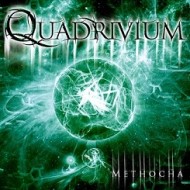 Listening to albums like this makes me feel really uncomfortable. It is the awkward moment, when you really have no idea of what to criticize. Although the bands abilities are developed to a maximum, the music seems kind of uninteresting. My personal opinion is that the band risked too much on this album. It may contain some very avant-garde and industrial inspirations (see Arcturus, Borknagar) and some existential attitude, which is a very good sign but, since Arcturus did this a thousand times better with both Simen ”Ics Vortex” Hestnaes and Kristoffer “Garm” Rygg, I can only explain it as a copy, or, if its too dodgy to say that, they are highly inspired by Arcturus and Borknagar, which makes it sound like we are listening to are a cover band after 20 minutes.
Listening to albums like this makes me feel really uncomfortable. It is the awkward moment, when you really have no idea of what to criticize. Although the bands abilities are developed to a maximum, the music seems kind of uninteresting. My personal opinion is that the band risked too much on this album. It may contain some very avant-garde and industrial inspirations (see Arcturus, Borknagar) and some existential attitude, which is a very good sign but, since Arcturus did this a thousand times better with both Simen ”Ics Vortex” Hestnaes and Kristoffer “Garm” Rygg, I can only explain it as a copy, or, if its too dodgy to say that, they are highly inspired by Arcturus and Borknagar, which makes it sound like we are listening to are a cover band after 20 minutes.
Quadrivium originate in Norway, forming in 2005 they have already released 2 albums and one EP; Adversus (2008), Metocha (2012) and Origo (2006) respectively. The bands line up consists of former members of Myrgrav, Lars “Leiðólfr” Jensen and Nordvang, along with Ragnarok’s bass Player Decepticon. Dear reader, I really have no idea how you will receive this, but to hell with Norway. Norway’s only hope in the music, they created, are the already known bands like Darkthrone, Mayhem, Gorgoroth, Shining (Nor) and even God Seed, who released an excellent album. Nothing new comes from Norway anymore.
But to be fair, Methocha contains some pretty good musical thoughts and atmospheric melodies. Atmosphere prevails throughout the album, along with Hellhammer inspired drumming and some Emperor styled parts, especially in the song ”Remnants of War” with keyboards adding an echoing psychedelia. What this band did in other words is to liberally borrow from Arcturus sound on albums like ”La Masquerade Infernale” and ”Sideshow Symphonies” and tried to add some originality, which comes across as really obscure. I think its ok. but more originality would be very welcome. Anyway, the best and most sophisticated song of the album, in my opinion, is ”The Labyrinth of Infinity”.
(6/10 Dionysios Mantis)

Leave a Reply